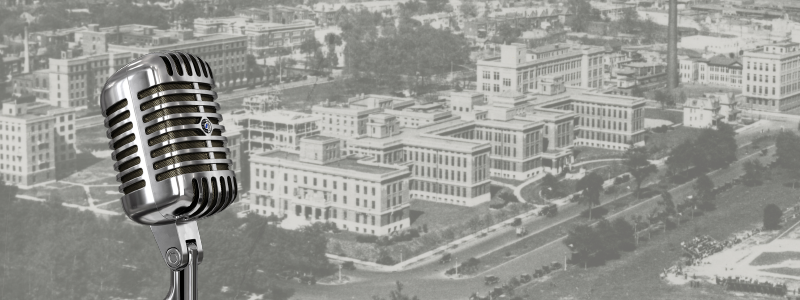
Washington University School of Medicine Oral Histories

Donald Schumacher Oral History
Interviewer
Bryan Sisk MD, MSCI
Files
Download Interview Transcript [PDF] (154 KB)
Summary
Donald Schumacher was interviewed by Brian Sisk on July 12, 2019 for approximately 53 minutes for the Pediatric Palliative Care Oral History Project.
Scope and Content
Dr. Schumacher begins the interview describing how his career plans changed after hearing “a very unbelievably moving lecture” from Elisabeth Kübler-Ross in 1975. Dr. Schumacher subsequently began his clinical work in both the adult and pediatric end of life care. Dr. Schumacher then recalls that as he became more focused on pediatric hospice care, he was met with a lot of clinician resistance such as “We’re not interested in pediatrics. It’s just too difficult, it’s too painful.”
Dr. Schumacher then describes transformative moments of his career such as his reflection on giving a lecture at a pediatrics conference in New York when the 2001 World Trade Center bombings occurred. He also reflects that clinician resistance to children’s palliative medicine was similar to the clinician resistance toward treating patients for the HIV/AIDs during the 1980s and ‘90s. After these reflective moments, Dr. Schumacher’s takes discusses his role organizational management and lobbying for federal legislation. Throughout his career, Dr. Schumacher successfully advocated for children’s concurrent palliative and hospice care with aggressive curative treatments to be included in the federal Affordable Care Act.
Dr. Schumacher describes initial clinician resistance to children’s palliative and hospice care to be one of his largest barriers in his career. He also describes his frustration with some clinicians who refused to innovate with new best practices. Dr. Schumacher concludes the interview with his dream for the new cohort of children’s palliative advocates to continue working towards integrated pediatric palliative and hospice services that provide streamlined and seamless service to patients and their families.
Biographical Information: Interviewee
Donald Schumacher, now retired, has served as the President and CEO of the National Hospice and Palliative Care Organization (NHPCO), the National Hospice Foundation, the Global Partners in Care, and the Hospice Action Network. In his four decades of service to children’s palliative and hospice care, Dr. Schumacher advocated for federal policy protections for concurrent care for seriously ill kids, opened numerous hospice and palliative care services that accept and treat kids, and was a global leader in children’s advocacy for hospice and palliative care.
Biographical Information: Interviewer
Bryan Sisk, MD, MSCI is an Assistant Professor in Pediatric Hematology and Oncology and an Assistant Professor in General Medical Sciences as a member of the Bioethics Research Center at Washington University in St. Louis. He completed medical school at the Cleveland Clinic Lerner College of Medicine at Case Western Reserve University. He completed his clinical training at St. Louis Children’s Hospital and Washington University School of Medicine.
Dr. Sisk was a clinical fellow in pediatric hematology and oncology when he initiated this Pediatric Palliative Care Oral History Project. As a trainee, Dr. Sisk had a strong interest in palliative care, the approach to the suffering of children, and the history of medicine. Prior to initiating this project, Dr. Sisk performed an in-depth review of the development of pediatric palliative care as a discipline and philosophy. This research culminated in a publication entitled, “Response to Suffering of the Seriously Ill Child: A History of Palliative Care for Children” in the journal Pediatrics. However, this historical review was limited to textbooks and publications. It lacked the personal experience of caring for these children and inspiring the development of a new clinical discipline. Inspired by David Clark’s oral history of the adult hospice movement, Dr. Sisk began to plan this pediatric oral history project.
Of note, this collection of oral histories is incomplete, and many important figures have not (yet) been interviewed. Dr. Sisk’s goal is to continue adding to this collection create a rich repository of personal insights and wisdom from leaders who changed the field of pediatrics.
Interview Date
2019-07-12
Collection Identifier
OH154-S31
Length
Approximately 53 minutes.
Restrictions
Users wishing to publish (in whole, or in part) content taken from the audio or transcript of this oral history interview must request, sign, and return a Statement of Use form to the Becker Archives. For detailed information regarding publication and use of this oral history, contact the Becker Archives (arb@wusm.wustl.edu).
Recommended Citation
Donald Schumacher Oral History, OH154-S31, Bernard Becker Medical Library Archives, Washington University in St. Louis.
Disclaimer
The Becker Archives provides access to this oral history interview as a record of the past. This interview reflects the attitudes, perspectives, and beliefs of the interview participants, which may reflect outdated, biased, and offensive views and opinions. The Becker Archives does not endorse the views expressed in this interview, which may contain materials offensive to some users.




Notes
Access to the audio recording for this oral history may be obtained via approval of the archivists at Becker Library. Contact the archives for more information (arb@wusm.wustl.edu).